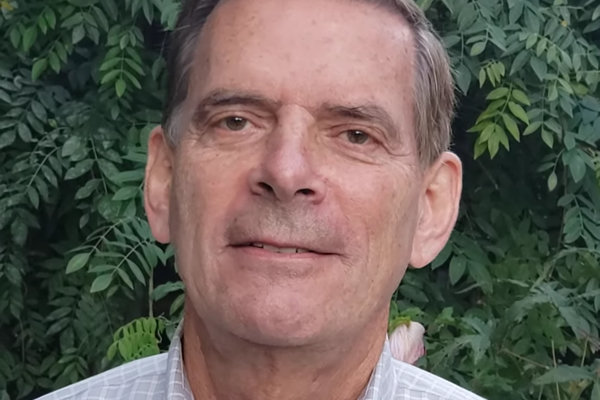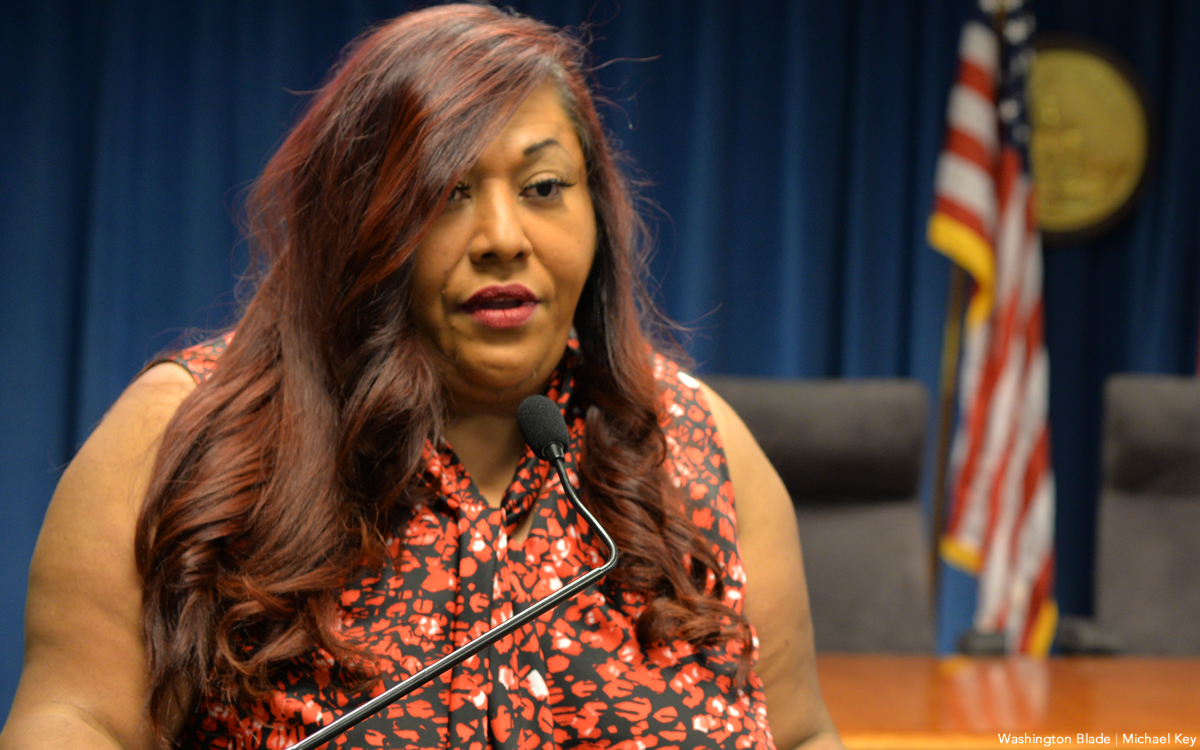Local
Va. candidate calls conversion therapy ban, trans student policies ‘overreach’
Republican Bob Frizzelle is running against Del. Karrie Delaney

The Republican who is seeking to unseat Virginia state Del. Karrie Delaney (D-Fairfax County), challenged her on social media for supporting a law that bans so-called conversion therapy for minors and efforts to protect transgender students from bullying and harassment.
Bob Frizzelle tweeted on Sept. 28 a video stating Virginia’s “new progressive laws” limit parents’ right to know if their child “changes their gender in school” or their right to take their child to “gender counseling.”
On Instagram and Facebook, Frizzelle criticized what he later told the Washington Blade was “overreach” by the state, and called out Delaney for supporting legislation that he felt stood between parents and their duty to ensure their children’s wellbeing.
“You have a minor child under the care and guidance of their parents until they reach 18 and the state steps in and decides what is allowed and not allowed in terms of gender counseling,” Frizzelle said.
“It seems conversion therapy is an exercise in cruelty and torture, and I’m not advocating that either, I wouldn’t want that,” he said. “But this is about counseling and parents being the main authority over what is best for their child instead of the state.”
The American Medical Association, the American Psychological Association and a host of therapeutic professional organizations oppose the use conversion therapy, stating it is ineffective, harmful and not evidence-based.
Currently, 20 states and numerous localities, including D.C., ban the use of this discredited practice.
Delaney voted for House Bill 386, sponsored by state Del. Patrick Hope (D-Arlington County), and helped make Virginia the first Southern state to ban conversion therapy for minors.
“For the record, I’m proud to have taken that vote,” Delaney told the Blade. “It’s a debunked, unethical practice that is proven to harm children.”
“In my view, it’s akin to fraud,” added Sasha Buchert, senior attorney for Lambda Legal’s D.C. office. “They’re attempting to implement a practice that has been shown not to provide effective treatment and is grounded not in science and medicine but in ideology.”
But, contrary to Frizzelle’s claim, parents can still take their children to LGBTQ counseling.
Both Delaney and Buchert emphasized the conversion therapy ban does not prevent parents from taking their children to a licensed therapist if they are struggling with understanding their gender identity or sexual orientation. They agreed that therapy must be evidence-based and proven, not abusive, or according to Buchert, “torture.”
According to a lawsuit filed in New Jersey in 2015 in which victims successfully shut down a religious organization practicing conversion therapy despite the state’s ban, “therapy” sessions involved “humiliating” acts, including reliving past abuse and enduring homophobic slurs as part of “talk therapy.”
“Remember, we’re talking about children,” Delaney said. “Hearing from some of those survivors, it’s pretty horrific.”
Last year, Delaney was one of four Democrats who killed House Bill 966, sponsored by state Del. Wendell Walker (R-Lynchburg), that would have allowed conversion therapy for minors if counseling involved “nothing more than ‘talk therapy.’”
“Anyone with any experience in this field knows it doesn’t have to be a physical type of therapy to do harm,” Delaney said. “‘Talk’ is a powerful tool. We license professions if there is harm that can be done. That applies to therapists in Virginia.”
Frizzelle also challenged Delaney’s support for the Virginia Department of Education model policies for protecting trans students from bullying and harassment in school.
He said the policies enable schools to change a student’s information in their records, such as their pronouns, without notifying parents.
“I haven’t read the trans statute,” Frizzelle admitted candidly. “But I think the school may tell the parents only if it wants to. The school then gets to decide to tell parents, if it wants to, if there is a significant event regarding their child. Should the school have this discretion?”
However, nothing in the governing statute passed last year prevents parents from receiving information about their child, according to Delaney, who was one of the House bill’s numerous sponsors.
“This bill does not take away any parental rights,” Delaney said. “Parents are not barred from having access to information about their students. There’s nothing in this law that says parents cannot be informed about their student.”
Delaney pointed out the purpose of the statute is to direct the state Department of Education and local school boards to develop policies that, according to its text, “address common issues regarding transgender students in accordance with evidence-based best practices.”
The text also states school policies are to protect trans students in “compliance with applicable nondiscrimination laws.”
“The purpose of these policies is to maintain a safe and supportive learning environment that is free from harassment so these kids can learn,” Delaney said.
Buchert added that LGBTQ youth reported “in study after study” high rates of harassment, bullying and discrimination from other students, teachers and administrators, particularly if they also were students of color.
“It leads you to missing school, it makes you not want to come to your gym class, it makes you fearful and leaves you pushed out into the school-to-prison pipeline,” she said.
Buchert also looked at the student privacy aspect of the law as necessary to protect LGBTQ students until they are ready to come out to their friends and family.
She said part of protecting students is giving them a safe space to learn more about themselves and who they are in the world, instead of forcing them out of the closet before they are ready.
“Your family may not be prepared or well-suited to help you navigate those unique struggles,” Buchert said, pointing out that while some parents are understanding and supportive, others might push the child out of the home to fend for themselves.
“And that’s why the LGBTQ youth homeless rate is so high,” Buchert said. “Forcibly outing them before they or their families are ready can be extremely harmful. The things Frizzelle is supporting would cause serious harm to LGBTQ youth and their families.”
Both Virginia’s conversion therapy ban and trans student protections passed with bipartisan support, and Delaney said they were examples of legislators doing their job to protect vulnerable children in the commonwealth.
But Frizzelle was still uncomfortable with how he perceived rights were balanced in these bills.
“I think this is such a thorny issue because you want to treat everyone with respect,” Frizzelle told the Blade. “And the reason I made the video and I have the objection is I’m uncomfortable with parents being separated from their children’s care by the state like this. I think that is not the proper function of the state.”
Delaney pointed it this in fact is the proper role of the state: To protect children whom studies have shown to be vulnerable targets of harassment, discrimination and abuse.
“What we’re trying to do as a legislature is protect these children,” Delaney said. “And Frizzelle is dividing parents over a problem that is manufactured and not based in fact, and that is very sad.”
Equality Virginia Executive Director Vee Lamneck agreed that the government has the authority and the duty to protect vulnerable people from harm. They also stated the government has the additional responsibility of ensuring everyone can benefit equally from public goods, such as receiving an education free from harassment.
“The government has the authority—and is supposed to use it—to protect vulnerable people from harm,” Lamneck said. “Laws that ensure transgender students can benefit from public education, and that LGBTQ young people are not subjected to practices that are known to cause lasting psychological damage, fall squarely within that authority and obligation.”
“No one, including parents, should be permitted to endanger the health and wellbeing of children in the ways prohibited by those laws,” added Lamneck.
District of Columbia
Ruby Corado sentencing postponed for third time
Attorneys say former Casa Ruby director has ‘significant medical issues’

A federal judge on April 8 approved a request by defense attorneys to postpone the sentencing of Ruby Corado, the founder and executive director of the now closed D.C. LGBTQ community services organization Casa Ruby on a charge of wire fraud, from April 29 to July 29.
Court records show that Judge Trevor N. McFadden of the U.S. District Court for the District of Columbia approved a motion filed by Corado’s two defense attorneys on that same day calling for the sentencing postponement on grounds of health issues.
“Ms. Corado has significant medical issues,” the April 8 motion states. “She has an important medical appointment related to one of her diagnoses scheduled in June 2025 and will need time to recover from that appointment,” it says.
The motion gives no further details on Colorado’s medical issues. A.J. Kramer, director of the D.C. Office of the Federal Public Defender, whose attorneys are representing Corado, said the office has a policy of never disclosing specific medical related information regarding its clients.
Court records show that prosecutors with the Office of the U.S. Attorney for D.C. did not object to the defense motion seeking the third sentencing postponement.
The records show that an earlier postponement of the sentencing, from March 28 to April 29, was initiated by the judge due to a scheduling conflict. The first postponement from Jan. 10 to March 28 came at the request of Corado’s attorneys, court records show.
Corado pleaded guilty on July 17, 2024, to a single charge of wire fraud as part of a plea bargain deal offered by prosecutors. The charge to which she pleaded guilty says she allegedly diverted at least $150,000 “in taxpayer backed emergency COVID relief funds to private offshore bank accounts for her personal use,” according to a statement released by the U.S. Attorney’s office.
Prosecutors have said funds that Corado allegedly diverted for her own use were intended to be used by Casa Ruby in support of its various programs, including housing services for homeless LGBTQ youth and support for LGBTQ immigrants.
The U.S. Attorney’s statement also notes that in 2022, when “financial irregularities at Casa Ruby became public,” Corado sold her home in Prince George’s County, Md. and “fled to El Salvador.” It was at that time that Casa Ruby ceased its operations.
Court records show that FBI agents arrested Corado on March 5, 2024, at a hotel in Laurel, Md., shortly after she returned to the U.S. At the request of her attorney and against the wishes of prosecutors, another judge at that time agreed to release Corado into custody of her niece in Rockville, Md., under a home detention order.
The release order came seven days after Corado had been held in jail at the time of her arrest by the FBI.
Under the federal wire fraud law Corado could be sentenced to a possible maximum sentence of 30 years in prison, according to the U.S. Attorney’s statement. However, court observers have said that due to Corado’s decision to waive her right to a trial and plead guilty, prosecutors will likely ask the judge to hand down a lesser sentence than the maximum sentence.
The statement by prosecutors points out that Corado’s decision to plead guilty to the one charge came after she had been charged in a criminal complaint filed on March 1, 2024, with bank fraud, wire fraud, laundering of monetary instruments, monetary transactions in criminally derived proceeds, and failure to file a report of foreign bank accounts.
All those charges except for the wire fraud charge were dropped at the time of her guilty plea.
District of Columbia
A room with Pride: D.C.’s LGBTQ history finds a new home at the Eaton
New suites highlight city’s queer community

Blocks away from where Frank Kameny once organized the first pickets for gay rights in Washington, a new hotel suite invites guests to relax, recharge, and revel in the LGBTQ history of the city with the capital’s first-ever Pride-themed room at the Eaton Hotel.
From the walls covered in Washington Blade archival photos from the past 50 years, to a vinyl library that spans decades and genres of music celebrated by LGBTQ fans, and little affirmations written on the mirrors, it becomes clear as soon as you open the door that this room is one of a kind.
The Blade sat down with Nina Ligon, the director of culture for the Eaton, in the suite to discuss why the boutique hotel has chosen to debut a Pride-themed room and how their unique mission-driven hospitality is at the center of it all.
Starting with how the relationship between the Blade and Eaton came to be, Ligon explained that the collaboration with D.C.’s principal LGBTQ newspaper has been around longer than she has been with the hotel.
“The Blade has always been present,” Ligon said. “It’s one of the entities here in the city that’s just always been around. When I came into my position here at Eaton, Sheldon Scott — our original director of culture who helped open the hotel — already had a relationship with Stephen [Rutgers] and other members of the Washington Blade. Through that we have been able to establish a really strong relationship in the city.”
That relationship flourished after the boutique hotel, which sees itself as more than a hotel — but a cultural hub for those wishing to explore Washington — was nominated for the Best of LGBTQ DC Awards, given out and published by the Blade.

“Beginning in 2022 we were first voted for best LGBTQ hotel in the city by the Best of LGBTQ DC Awards,” she said. “In 2023 we fell off, but that’s all right. We did get Editor’s Choice in 2024, and we’re gonna make a comeback.”
That comeback, Ligon hopes, is aided by the addition of the new Capital Pride-themed hotel suite, which used feedback from LGBTQ hotel staff to determine what went in the room.
“It’s community. We have a really great team here at Eaton, so we were able to put together a committee with anyone who wanted to be involved and have some say. And that’s not just the pride suite specifically, but World Pride in general — in our pride efforts, 365, right throughout the year. A lot of these,” she said, pointing to the walls covered in framed photos taken from the Blade archive, “are ideas that came up during those early meetings just a few months ago. There were discussions of inflatable chairs and disco balls, and I was for it. I’m here to support their creative vision. And you know, we have to involve the corporate folks, and they’re a little more traditional than some of us. But the team really came together with some of the pieces and the timeline wall art that we’re working on.”
Ligon continued, explaining that special attention was given to ensure diverse LGBTQ experiences are represented in the room. From the pictures of LGBTQ icons like Marsha P. Johnson and RuPaul, to the music on their sound system (including Chappell Roan’s “The Rise and Fall of a Midwest Princess” and Troye Sivan’s “Bloom”), and the quotes on the walls, their goal was to uplift the whole LGBTQ community rather than one particular identity.
“My colleague, Eduardo [Romero], who’s been just a beam of light in my life, brought this to my attention. As a Black woman, I was reading through the Blade’s archive links and was sifting through some of those and he was like, ‘Okay, yeah, these look good, but there’s some people who are missing.’ Capital Pride has been traditionally cis, white male led. He helped me, as a Black woman, to step back and say. ‘Say, oh, wait, there’s more that we can be representing here. There are more people we could be representing.’ And so I reached out to DC Black Pride to see what image imagery they may have had and what input they had. And we were able to come up with a little something.”
As the tour of the room came to a close, Ligon told the Blade what she hopes people get from staying in this suite.
“When it comes to Pride, Pride is resistance,” she said. “Pride is more than just a party. Pride is an opportunity. It started with people who were fighting for their rights and their mere existence. And so I really want people, whether they come here to party or to take a load off, I really want them to take some time to reflect and see Pride for what it is, and that first being a form of resistance as we chart the course forward into a brighter future for the LGBTQ community and for all. None of us are free until we are all free. And I hope that this will be a reflection of that.”
The Eaton Hotel is at 1201 K St., N.W.

Opinions
We must show up to WorldPride 2025 in D.C.
Boycotts offer symbolic protest, but absence creates silence

As an LGBTQI+ activist from Argentina, a country currently facing deep setbacks under an openly anti-rights government, I understand the frustration and fear many are expressing about attending WorldPride 2025 in the United States. I also understand the symbolic weight of showing up anyway.
Following the announcement by Egale Canada and the African Human Rights Coalition that they are withdrawing support for WorldPride due to the Trump administration’s anti-LGBTQI+ stance, concerns have rightly been raised about safety, complicity, and principle. These concerns must not be dismissed. But they must be responded to with a deeper strategic reflection: Visibility, presence, and collective action remain our greatest tools in confronting oppression.
Boycotts may offer symbolic protest, but absence creates silence
WorldPride is not organized by the U.S. government. It is a platform created by and for LGBTQI+ civil society — local activists, grassroots groups, trans-led collectives, BIPOC-led organizations, and everyday people building community despite hostile political environments. Boycotting this space sends a message not only to the Trump administration, but to our own movement: That when things get hard, we retreat.
History teaches us otherwise.
In 1990, amid the AIDS crisis and government neglect, activists did not boycott — they stormed the National Institutes of Health and the FDA. In 2014, when Russia passed its “gay propaganda” law, global solidarity at the Sochi Olympics became a powerful moment of protest and resistance. And in 2020, amidst a pandemic and police violence, Pride went digital but never disappeared.
If we set the precedent that global LGBTQI+ events cannot happen under right-wing or anti-LGBTQI+ governments, we will effectively disqualify a growing list of countries from hosting. That includes not only the U.S. under Trump, but Hungary, Italy, Uganda, Poland — and even my own country, Argentina, under Javier Milei. Yet ILGA World still plans to convene its 2027 conference in Buenos Aires, and rightly so. We must not surrender global platforms to the very governments that wish to erase us.
WorldPride is not a reward for good governance. It’s a tool of resistance
To those who say attending WorldPride in D.C. normalizes Trump’s policies, I say: What greater statement than queer, trans, intersex, and nonbinary people from around the world gathering defiantly in his capital? What more powerful declaration than standing visible where he would rather we vanish?
Safety is paramount, and all governments — including the U.S. — must guarantee the protection of LGBTQI+ participants. But refusing to engage is not the answer. In fact, visibility in hostile spaces has always been a hallmark of our movement’s strength. We showed up at Stonewall. We marched on Washington in 1979. We protested during the AIDS crisis, and we will show up again now — not in spite of adversity, but because of it.
We are in a global moment of rollback. Division is what our opponents want
The rise of anti-gender ideology and trans-exclusionary narratives has created fertile ground for far-right movements worldwide. In this moment, LGBTQI+ solidarity must be global, intersectional, and uncompromising. We cannot afford to fracture our own movement based on geopolitical fault lines.
Egale Canada and the African Human Rights Coalition raised legitimate criticisms — of U.S. foreign policy, immigration barriers, and systemic racism. But those issues must be confronted within WorldPride, not from outside it. We must bring those critiques into plenaries, panels, and the streets of Washington. We must create space for diasporic, racialized, and grassroots-led voices. We must use this moment to hold institutions accountable and shift the power of Pride to those most affected.
Because that is what solidarity looks like — not abandonment, but engagement.
WorldPride 2025 must not be a party disconnected from reality. It must be a protest rooted in our global truths.
Let us not cede this space. Let us make it ours.
Mariano Ruiz is the president of Derechos Humanos y Diversidad Asociación Civil in Argentina. He is also a 2019 Columbia HRAP Alumni.
-

 Virginia3 days ago
Virginia3 days agoYoungkin calls on gay Va. GOP LG candidate to exit race over alleged ‘porn’ scandal
-

 Commentary5 days ago
Commentary5 days agoA conversation about queers and class
-

 Kenya5 days ago
Kenya5 days agoKenya Red Cross-owned hotel to host anti-LGBTQ conference
-

 Opinions4 days ago
Opinions4 days agoNavigating employer-sponsored health insurance, care








